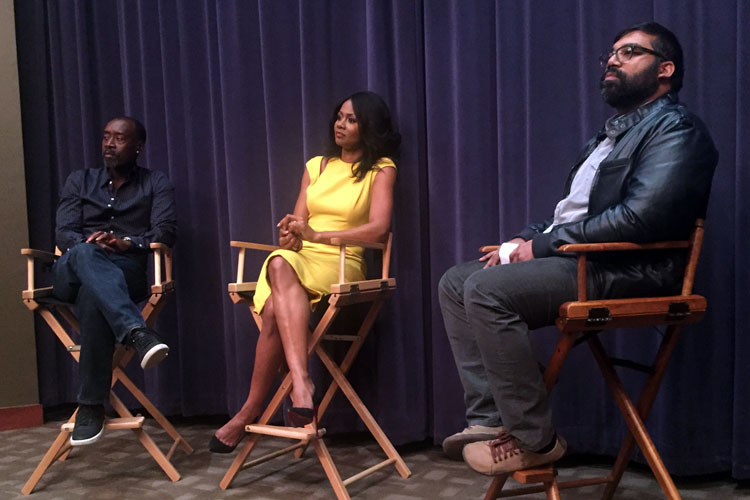The following questions and answers are excerpted from a conversation that followed the NBR screening of Miles Ahead.
This is not a typical biopic in that you mainly focus on the darkest period of his life. Why did you choose that window?
Don Cheadle: When you’re hearing the story of Miles Davis and all of those prolific years, how he left Juilliard and went to New York and he was playing with his idols and then going, that’s not quite it, I want to find something else, and he leaves that, and seeks out something else, then he starts working with Gil [Evans]. And then he tries classical, this dynamic movement into modality, and that changes music, and then everyone wants to play modal, and then he moves into modal swing, fusion funk . . . he’s all these different things. And then he just shuts it down for five years. I thought, what’s happening there? What does that mean? What’s he doing during that period? How does he come out of that period? Does he come out of that period? What does he say when he comes out of that period? For me, it was a very intriguing part of his life as a jumping off point. As filmmakers, we were attempting to externalize an internal process. We wanted this mercurial storyteller – being Miles Davis – to take the reins and say, I’m going to tell you what this is like. We wanted to let him play, that was the conceit. I wanted it to feel experiential more than informational.
“I wanted it to feel experiential more than informational.”
Your performance of Francis Turner is so nuanced. What drew you to her?
Emayatzy Corinealdi: For me the thing that was the most interesting was the request he made of Francis, to leave her career. And the fact that she did it, whether it was willingly or unwillingly. That was most interesting to me as a woman. It might have been more common in that time period than it would be now, but given where she was in her career, she had already achieved so many things – especially for a black woman of that time – that it was interesting that giving up dancing was something she was willing to do. That drew me in. And of course, I was intrigued by the dynamics of their relationship. It was up, down, sideways, it was everything. That was something I didn’t know about Miles Davis. And I didn’t know much about Francis Taylor coming into the project so I was very curious to explore it all.
Miles had other wives and many other women. What was so special about his relationship with Francis?
Cheadle: They were both really at the height of chasing their artistic expression, discovering what that was about. This possessive nature of who he was and jealousy and fear went into his wanting her to be his and only his. But her saying yes, agreeing to it . . . once they signed that contract, that was a contract signed in blood in a way, and there was only one way that relationship could devolve from that point. To me, the success of that relationship is her leaving.
Corinealdi: Absolutely.
Cheadle: The success is her saving herself and never returning to that dynamic.
One of my favorites lines in the film is what Miles says during a session, “Be wrong strong.” Can you talk about its meaning?
Cheadle: It was the Miles philosophy from the way he approached his music. I talked to a lot of musicians that played with him. I was talking to Herbie [Hancock]. The first time Herbie played on stage with Miles, Miles just started playing, and Herbie looked around, he didn’t know what they were playing. Miles came over to him and asked what was wrong. Herbie said, “I don’t know what to play.” And Miles goes, “Piano, motherfucker. That’s why I hired you.” He was like, go, follow your instincts, and then I’ll follow you. Tony Williams was 17 years old when he was running Miles’s band. Who would put a 17 year-old in charge of your band? But Miles knew he needed someone that needed to be chasing something. Herbie also said Miles told them that they were being paid to practice in front of people. If Miles heard you performing a solo in your room and you came down and played it on stage, you were fired. It was about chasing something and being wrong strong, if you’re going to be wrong. Fear no mistakes, for there are none. That was something Miles always said. Always be in pursuit of something, the next thing. A lot of people rejected Miles when he went away from playing acoustically, thinking that’s where he belonged. That’s the epitome to me of being wrong strong. If you’re going to be wrong, commit to that mistake and push it all the way.
Did that philosophy make its way into any of the performances?
Corinealdi: My approach with Francis was that their relationship was such a major part of her life. My focus was on her truth and what she felt were the things that were important to her. There were things that were really instrumental to making or breaking their relationship. So in that sense there may have been some things that happened that she had to be wrong strong about. If some people in her life may have felt that it was a wrong decision to give up her career, she was wrong strong because she did it and committed to it. But at the end of the day, again, the success in their relationship was that she was able to extricate herself from it. To me, that’s what highlights her strength as a woman.

